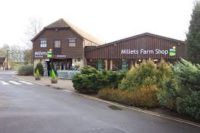MOVE IT FOR MS
24 APRIL 2019 2PM-4PM
Please come and join us for an afternoon of exercise, relaxation sessions, tea/coffee/biscuits and chat.
Physiotherapists from the Physical Disability Physiotherapy Service will be running exercise classes and relaxation sessions. The classes will be suitable for people with MS of all abilities, including those in wheelchairs. Come along and have a go!
Information will be available about exercise with MS locally, and Sue Barnden, the MS specialist nurse, will be there.
Please contact PDPS on 01865 904411 for more information or with any questions.
Abingdon Health and Wellbeing Centre, Crabtree Place, Audlett Drive
Abingdon OX14 3GD








